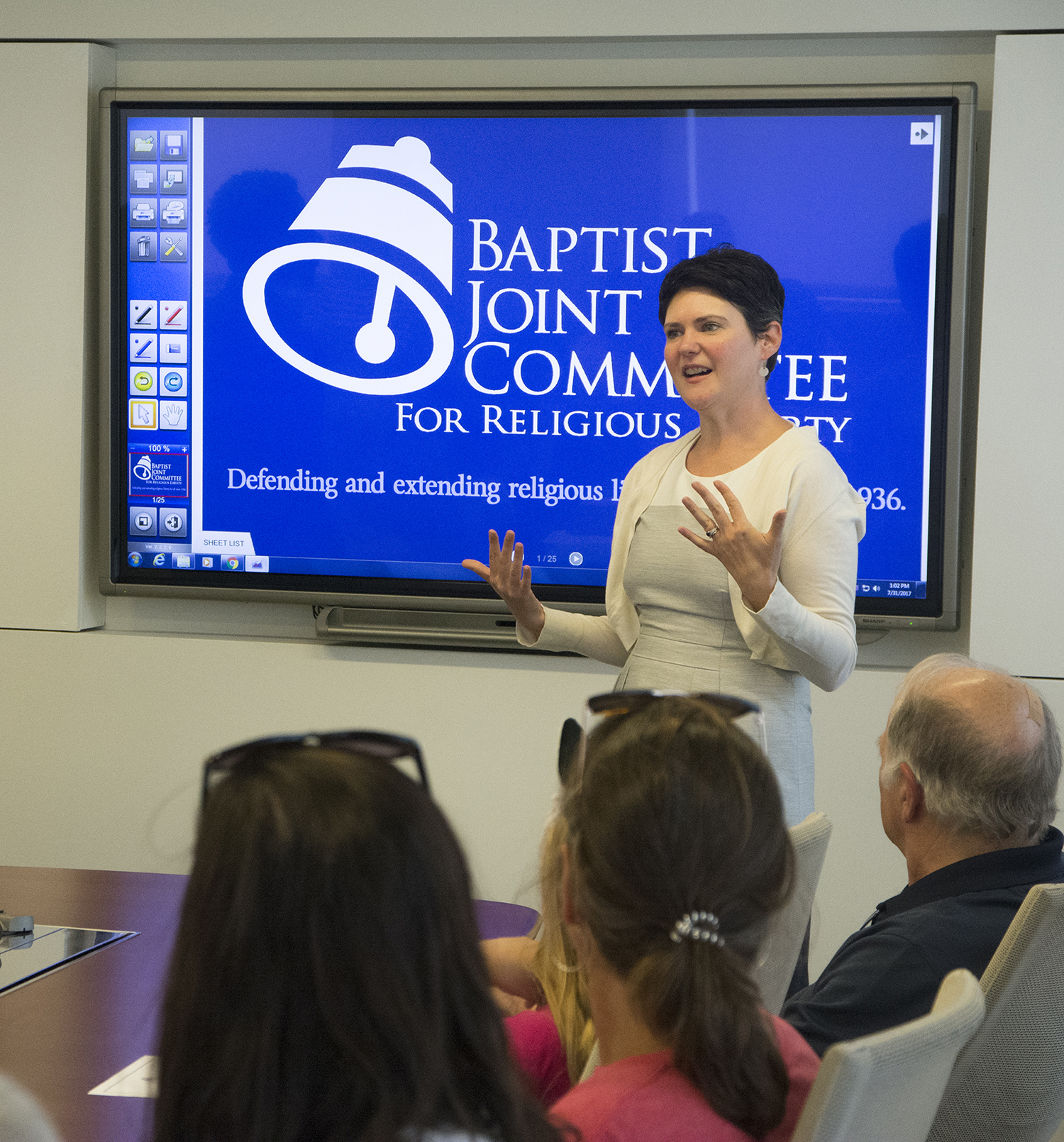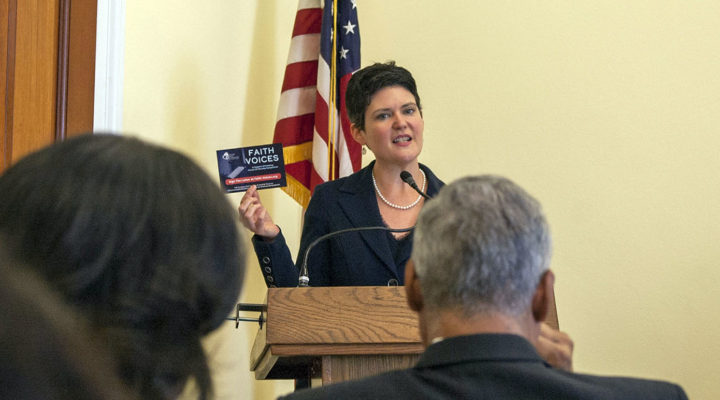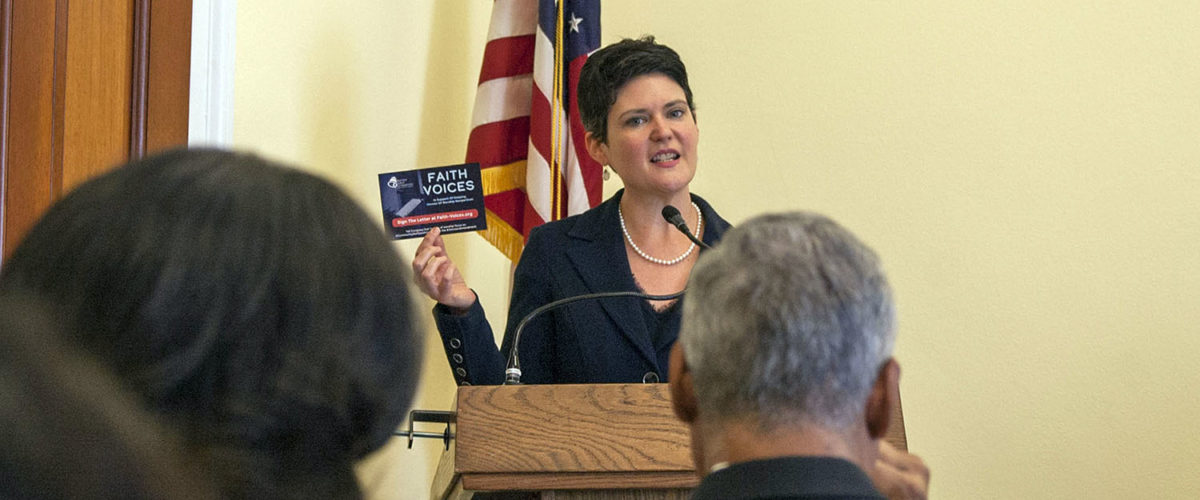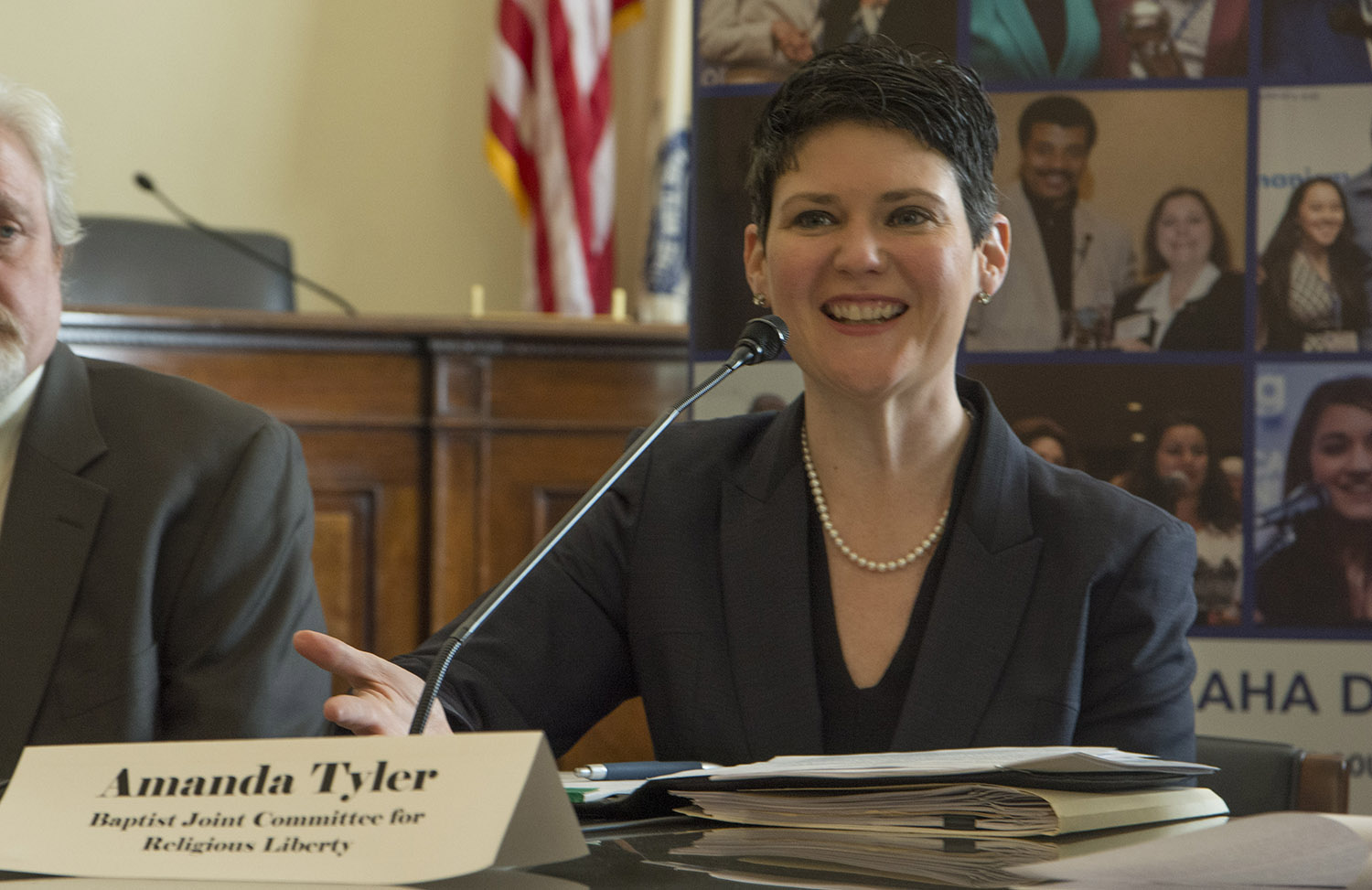Amanda Tyler’s work plan for 2017 fell off the truck like one pumpkin too many on election night 2016.
Tyler was elected in September 2016 as executive director of the Baptist Joint Committee for Religious Liberty and immediately started planning her course of work for when she would take office Jan. 3.
Her plan did not include responding to the newly elected president’s travel ban on visitors from several predominantly Muslim countries and his pledge to “destroy” the Johnson Amendment that threatens the tax-exempt status of churches that engage in political activity.
Those pronouncements “really changed the direction of what I thought my work was going to be,” says Tyler, who brought extensive experience in religion, law and government into her role, including a degree in foreign service from Georgetown University and a stint as the BJC’s assistant to the general counsel. She came to the organization from the office of U.S. Rep. Lloyd Doggett (D-Texas), where she was his counsel on the Ways and Means Committee. She has worked in Congress and in private legal practice, and has clerked for a federal judge.
A native of Austin, Texas, Tyler lives in Washington with her husband, Robert Behrendt, and toddler son, Phelps.
“Religious liberty is our client,” said Tyler in a September interview in her office, from which she can see the U.S. Capitol. When the liberty to practice any religion — or to decline to practice religion — is threatened, the Baptist Joint Committee works to defend the principle.
The Baptist Joint Committee for Religious Liberty was once known as the Baptist Joint Committee on Public Affairs. Today 15 Baptist organizations “that span the spectrum of Baptist life” support the organization, as well as a number of individuals and foundations.
“That jointness gives us a lot of strength,” said Tyler. “These Baptists have come together to agree that religious liberty is foundational to our faith.”
[Best_Wordpress_Gallery id=”3″ gal_title=”Amanda Tyler Gallery”]
While defending the rights of Muslims and other non-Christian religions to practice their faith freely is an unpopular concept for some, it is not a new position for Baptists, as they’ve held it since the earliest days of U.S. history. Roger Williams, who as a Baptist founded the colony of Rhode Island as a haven for religious liberty, specifically mentioned “Turks,” or Muslims, as equal benefactors of liberty.
Barely settled in her new office, Tyler knew immediately when Donald Trump’s ban on refugees from those countries was announced that her agency would need to get involved, because it “raised issues of Islamophobia and anti-Muslim sentiment,” she said. “Our role as the Baptist Joint Committee is to stand up for our neighbors and show that’s a religious liberty issue.”
The so-called Johnson Amendment, named for then-Senator Lyndon Johnson from Texas, refers to a 1954 change in the U.S. tax code to prohibit tax-exempt organizations — not just churches — from either endorsing or opposing political candidates.
While some political activists feel the Johnson Amendment unfairly limits such organizations from the political process, Tyler says others “credit it with protecting the charitable sector from a lot of the ugliness of political campaigning.”
She reminds churches that the Johnson Amendment does not prohibit discussion of political issues, the distribution of surveys or information, or the appearance of politicians at churches or even to speak. But no tax-exempt organization is to endorse a candidate.
“The Baptist Joint Committee has been a leader to help organize the faith community to explain to Congress that we see current law as striking the right balance that allows plenty freedom of speech for pastors, but also keeps campaigns and their donors from seeking endorsements and funds from the church,” Tyler said. “Nothing in current law keeps pastors from speaking from the pulpit on issues. This is about partisan campaigning and fundraising.
“Nothing in current law keeps pastors from speaking from the pulpit on issues. This is about partisan campaigning and fundraising. There is a big different between being political and being partisan.”
“There is a big difference between being political and being partisan.”
Tyler says she wryly encourages pastors to consider that the Johnson Amendment provides them cover for such times when both city council candidates are members of the same church.
Punching above its weight
Housed on the third floor of the Veterans of Foreign Wars building, a 10-minute walk from Capitol Hill and virtually across the street from the Hart Senate Office Building, the Baptist Joint Committee is a small, religious organization operating in the shadows of the most important seat of power in the world. How can it impact deliberations of the decision makers?
The Baptist Joint Committee staff of nine “punches above our weight for the size of organization we are because of the respect the BJC has earned,” Tyler maintains. She is nearing the end of her first year leading a feisty agency with an 80-year history of boldly waving the banner for religious liberty, even for religious organizations with whom it might not agree.
That universal commitment to religious liberty affords the BJC a “surprise factor” because legislators often are puzzled that Baptists are committed to religious liberty for all persons, even including atheists.
“If it’s just religious freedom for some, it’s really religious freedom for none,” Tyler said.
Tyler said the BJC agenda primarily is set by the Supreme Court docket and proposed legislation. Its staff haunts congressional offices and files briefs regularly to inform legislators and the court and to advocate for religious liberty.
The Baptist Joint Committee deals primarily with legislation or litigation at the national level, and then only when it has a religious liberty implication.
For instance, it doesn’t lobby one way or another for “health care” as a whole. But when The Little Sisters of the Poor complained that their exemption on religious grounds from the contraceptive mandate in The Affordable Care Act wasn’t enough, the Baptist Joint Committee got involved.
Tyler said that while the exemption from the contraceptive mandate was fitting, “We feared that overreach by the plaintiffs to demand more might throw into jeopardy the idea of religious accommodations at all.”
Permissible benefits
Americans who believe government and religion should have nothing whatsoever to do with one another do not understand their interweaving in this country’s DNA. There are times and circumstances when both government and religion benefit by mutual cooperation.
The Baptist Joint Committee keeps its eye on what Tyler calls “permissible accommodation in terms of what government does for religion.”
A recent Supreme Court case, for example, ruled that Trinity Lutheran Church in Columbia, Mo., was eligible to receive funds to add a rubberized surface to its playground, an area not exclusively religious and on which community children played.
Although every case is narrowly defined by the facts particular to it, the Trinity case may open the question if churches are eligible for disaster relief funding, especially if their facilities are used for, say, community relief, homeless shelters and food pantries.
While it might seem on the surface that churches would welcome such funds, Tyler cautions that “faith communities need to be mindful of any time they cooperate with government, particularly [receiving] government funding, because of the strings that will follow.”
“We want to make sure generations coming next have a grounding in Baptist history and heritage. I don’t know where else they would get this education we’re providing.”
At the same time, churches benefit because they do not have to apply for 501(c)(3) nonprofit status. That status comes automatically for a church. Churches do not have to file Form 990 for the IRS, which asks other nonprofits for particular information about budgets, gifts and leadership. Churches and other nonprofits do not have to pay property taxes. And ordained ministers, for now, still can receive a significant tax break by claiming a deduction for housing expenses.
A large part of the Baptist Joint Committee mission is to educate the next generation so it doesn’t take religious freedom for granted. Tyler and staff travel extensively to colleges and conferences for educational purposes.
“We want to make sure generations coming next have a grounding in Baptist history and heritage,” Tyler said. “I don’t know where else they would get this education we’re providing.”
Society needs critical thinkers when so many issues are presented as black or white. The BJC challenges them to “view these issues with the complexity they deserve.”
Although there is no current challenge on which they are working, school prayer continues to be an issue misunderstood and likely to continue to be into the near future, she said. Some Baptists for years have bridled under the Baptist Joint Committee’s position that they interpret as opposing school prayer.
Tyler points out the difference between government sponsorship of religion and a person’s individual right to express his or her religion in a school setting. The latter has never been denied.
“It’s precisely because we are for prayer that we are opposed to government sponsorship of prayer,” Tyler said.

Educational opportunities — this one led by Amanda Tyler — are key features of the Baptist Joint Committee’s mission. (PHOTO/BJC)
She reminds that the Bill of Rights is a minority rights document. While the idea of representational government in the U.S. protects the majority, the Bill of Rights, she said, protects various minorities.
Yet, minority rights protections are not absolute. They have to be balanced against the protection of others. “Figuring out where that line is, is more difficult.”
“That’s why these difficult cases come up at the Supreme Court,” she said. They remind us that we are instructed to consider the rights of all, including those with whom we vehemently disagree and don’t understand.”
Little if anything is “black and white” in the difficult cases that rise to the Supreme Court. How do you measure the right of a business person to deny service to a couple whose wedding he feels is contrary to his religious beliefs, against the right of the couple not to be discriminated against in the simple request for a cake?
Each case that comes to the Supreme Court is considered on very narrow facts specific only to that case, Tyler said. Issues around gay marriage are new and “still being worked out.”
Is such a case more about civil rights and equal protection for all, regardless of race, color or creed? Or is it more about religious freedom and the right of a person with strongly held religious beliefs to deny service to those whose actions offend those beliefs?
Tyler was “surprised” that the Supreme Court accepted this particular case and the Baptist Joint Committee has not yet filed a brief on either side of the issue.
“We believe there is harm done when we try to make a false dichotomy between religious rights versus civil rights,” Tyler said. “Making it black and white makes it harmful to both. We look for ways to accommodate religious practice while honoring the rights of everyone. These are not easy cases. People who try to make them easy cases on one side or the other are doing a disservice. “
When asked about a recent PRRI poll that says the majority of white evangelicals feel that Christians are more persecuted in America than are Muslims, Tyler said that poll “shows one of our big challenges.”
“The idea of religious persecution is all too often in the eye of the beholder. We have a very different way of looking at these issues. When you think about the divide in this country right now, it presents problems on many different levels, particularly in our area of work of defending religious freedom. If we can’t agree on what that means, we have a big challenge ahead.
“Silence is not an option. A full throated defense of religious freedom is required here.”
“We must come to common understanding of what religious liberty means and the Baptist Joint Committee alone cannot solve that problem.”
The stunning August weekend in Charlottesville, Va., that saw Nazis clash with others who opposed them was a “horrific” example of hate, Tyler said. “Just the fact that it’s occurring in 2017 America is pretty horrifying.”
But those issues and others surely to follow beg a response from persons and agencies entrusted with defending historic values of religious liberty.
Now that such hate and racism and attitudes so contrary to American and Baptist history and values are out there, Tyler said, “this is where we have the opportunity to stand for our historical values, to give the history, to have a Baptist witness in response to this.“
“Silence is not an option,” she said. “A full throated defense of religious freedom is required here.
“I’m talking about religious freedom, not tolerance. Tolerance presupposes superiority. I tolerate your opinion. Freedom on the other hand, implies God-given equality. I don’t ‘give you’ freedom; you have it.”
Related story:
Church-state experts voice concern about new religious-liberty guidelines



